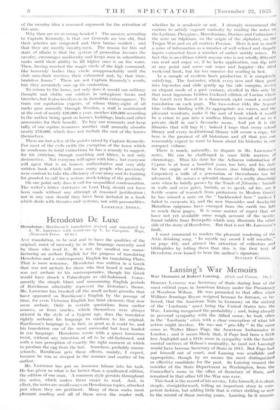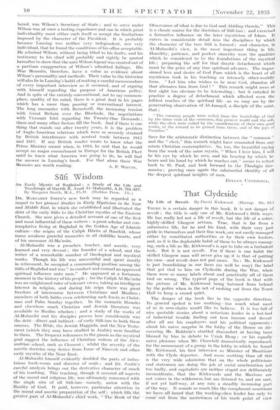Lansing's War Memoirs
War Memoirs of Robert Lansing. (Rich and Cowan. 18s.)
Romer LANSING was Secretary of State during four of the most critical years in American history under the PresideneY of Woodrow Wilson. He was promoted to that office when William Jennings Bryan resigned because he foresaw, or be- lieved, that the American Note to Germany on the sinking of the Lusitania ' must bring the United States into the War. Lansing recognised the probability ; and, being already in personal sympathy with the Allied cause, he took office in the Lusitania ' crisis with a clear conception of what his action might involve. He was not " pro-Ally " in the Same sense as Walter Hines Page, the American Ambassador in London ; and it seems likely that, if Page had been a little less Angiophil and a little more in sympathy with the ffinda- mental motives of Wilson's neutrality, he (and not Lansing) would have beconie Secretary of State in 1915. But Page had put himself out of court, and Lansing was available and appropriate, though by no means the most 'distinguished or effective candidate for the post. So Lansing crossed the corridor of the State Department in Washington, from the Counsellor's room to the office of Secretary of State, and remained in that office till the War was over. • This book is the record of his service. Like himself, it is cleari simple, straightforward, telling an important story in com- petent fashion, but adding little that is either striking or new to the record. of those moving. years.. Lansing, be it remenl' bered, was Wilson's Secretary of State ; and to serve under Wilson was at once a testing experience and one in which great individuality must either curb itself or accept the limitations imposed by the character of the President. It is probably because Lansing was neither very independent, nor very individual, that he found the conditions of his office acceptable. He admired Wilson, without being blind to his faults, and his testimony to his chief will probably and rightly be quoted hereafter to show that the anti-Wilson legend was created out of a partisan exaggeration of Wilson's admitted failings. His War Memoirs; therefore, have a value as evidence about Wilson's personality and methods. Their value to the historian will also lie in Lansing's habit of making a careful memorandum of every important interview as it occurred, and of arguing with himself regarding the purpose of American policy. And in spite of the entirely conventional, not to say common- place, quality of his mind, there is a great deal in his pages which has a more than passing or conventional interest. The long encounter with Bernstorff, the increasing tension with Great Britain over the Blockade, the negotiations with Viscount Ishii regarding the Twenty-One Demands ; these and many other factors fill the book. And if there is one thing that stands out after twenty years, it is the problem of Anglo-American relations which were so severely strained by British interference with neutral trade between 1915 and 1917. If any British reader wants to know what the Prime Minister meant when, in 1934, he said that he would accept no major commitment in Europe for. the British Fleet until he knew what America was going to do, he will find the answer in Lansing's book. For that alone these War































































































 Previous page
Previous page